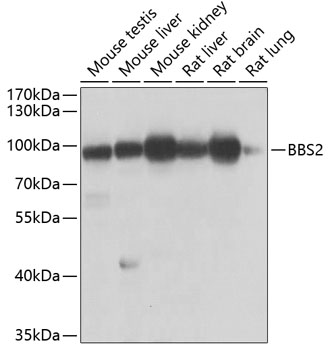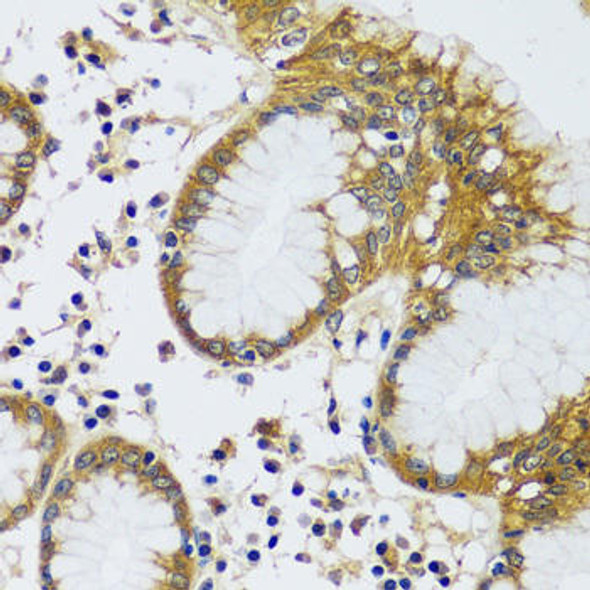Cell Biology Antibodies 11
Anti-BBS2 Antibody (CAB7425)
- SKU:
- CAB7425
- Product Type:
- Antibody
- Reactivity:
- Mouse
- Reactivity:
- Rat
- Host Species:
- Rabbit
- Isotype:
- IgG
- Antibody Type:
- Polyclonal Antibody
- Research Area:
- Cell Biology
Description
| Antibody Name: | Anti-BBS2 Antibody |
| Antibody SKU: | CAB7425 |
| Antibody Size: | 20uL, 50uL, 100uL |
| Application: | WB |
| Reactivity: | Mouse, Rat |
| Host Species: | Rabbit |
| Immunogen: | Recombinant fusion protein containing a sequence corresponding to amino acids 1-96 of human BBS2 (NP_114091.3). |
| Application: | WB |
| Recommended Dilution: | WB 1:500 - 1:2000 |
| Reactivity: | Mouse, Rat |
| Positive Samples: | Mouse testis, Mouse liver, Mouse kidney, Rat liver, Rat brain, Rat lung |
| Immunogen: | Recombinant fusion protein containing a sequence corresponding to amino acids 1-96 of human BBS2 (NP_114091.3). |
| Purification Method: | Affinity purification |
| Storage Buffer: | Store at -20'C. Avoid freeze / thaw cycles. Buffer: PBS with 0.02% sodium azide, 50% glycerol, pH7.3. |
| Isotype: | IgG |
| Sequence: | MLLP VFTL KLRH KISP RMVA IGRY DGTH PCLA AATQ TGKV FIHN PHTR NQHV SASR VFQS PLES DVSL LNIN QAVS CLTA GVLN PELG YDAL LVGT |
| Gene ID: | 583 |
| Uniprot: | Q9BXC9 |
| Cellular Location: | Cell projection, Cytoplasm, centriolar satellite, centrosome, cilium membrane, cytoskeleton, microtubule organizing center |
| Calculated MW: | 79kDa |
| Observed MW: | 100kDa |
| Synonyms: | BBS2, BBS, RP74 |
| Background: | This gene is a member of the Bardet-Biedl syndrome (BBS) gene family. Bardet-Biedl syndrome is an autosomal recessive disorder characterized by severe pigmentary retinopathy, obesity, polydactyly, renal malformation and mental retardation. The proteins encoded by BBS gene family members are structurally diverse and the similar phenotypes exhibited by mutations in BBS gene family members is likely due to their shared roles in cilia formation and function. Many BBS proteins localize to the basal bodies, ciliary axonemes, and pericentriolar regions of cells. BBS proteins may also be involved in intracellular trafficking via microtubule-related transport. The protein encoded by this gene forms a multiprotein BBSome complex with seven other BBS proteins. |
| UniProt Protein Function: | BBS2: The BBSome complex is required for ciliogenesis but is dispensable for centriolar satellite function. This ciliogenic function is mediated in part by the Rab8 GDP/GTP exchange factor, which localizes to the basal body and contacts the BBSome. Rab8(GTP) enters the primary cilium and promotes extension of the ciliary membrane. Firstly the BBSome associates with the ciliary membrane and binds to RAB3IP/Rabin8, the guanosyl exchange factor (GEF) for Rab8 and then the Rab8-GTP localizes to the cilium and promotes docking and fusion of carrier vesicles to the base of the ciliary membrane. Defects in BBS2 are the cause of Bardet-Biedl syndrome type 2 (BBS2). Bardet-Biedl syndrome (BBS) is a genetically heterogeneous, autosomal recessive disorder characterized by usually severe pigmentary retinopathy, early onset obesity, polydactyly, hypogenitalism, renal malformation and mental retardation. Secondary features include diabetes mellitus, hypertension and congenital heart disease. A relatively high incidence of BBS is found in the mixed Arab populations of Kuwait and in Bedouin tribes throughout the Middle East, most likely due to the high rate of consaguinity in these populations and a founder effect. |
| UniProt Protein Details: | Protein type:Cell development/differentiation Chromosomal Location of Human Ortholog: 16q21 Cellular Component: cytosol Molecular Function:protein binding Biological Process: fat cell differentiation; negative regulation of multicellular organism growth; striatum development; organelle organization and biogenesis; hippocampus development; photoreceptor cell maintenance; positive regulation of multicellular organism growth; vasodilation; melanosome transport; protein localization; visual perception; protein localization in organelle; sensory cilium biogenesis; cartilage development; adult behavior; Golgi to plasma membrane protein transport; sperm axoneme assembly; brain morphogenesis; cerebral cortex development; artery smooth muscle contraction Disease: Bardet-biedl Syndrome 2 |
| NCBI Summary: | This gene is a member of the Bardet-Biedl syndrome (BBS) gene family. Bardet-Biedl syndrome is an autosomal recessive disorder characterized by severe pigmentary retinopathy, obesity, polydactyly, renal malformation and mental retardation. The proteins encoded by BBS gene family members are structurally diverse and the similar phenotypes exhibited by mutations in BBS gene family members is likely due to their shared roles in cilia formation and function. Many BBS proteins localize to the basal bodies, ciliary axonemes, and pericentriolar regions of cells. BBS proteins may also be involved in intracellular trafficking via microtubule-related transport. The protein encoded by this gene forms a multiprotein BBSome complex with seven other BBS proteins.[provided by RefSeq, Oct 2014] |
| UniProt Code: | Q9BXC9 |
| NCBI GenInfo Identifier: | 20454827 |
| NCBI Gene ID: | 583 |
| NCBI Accession: | Q9BXC9.1 |
| UniProt Secondary Accession: | Q9BXC9,Q96CM0, Q96SN9, |
| UniProt Related Accession: | Q9BXC9 |
| Molecular Weight: | 721 |
| NCBI Full Name: | Bardet-Biedl syndrome 2 protein |
| NCBI Synonym Full Names: | Bardet-Biedl syndrome 2 |
| NCBI Official Symbol: | BBS2 |
| NCBI Official Synonym Symbols: | BBS |
| NCBI Protein Information: | Bardet-Biedl syndrome 2 protein |
| UniProt Protein Name: | Bardet-Biedl syndrome 2 protein |
| Protein Family: | Bardet-Biedl syndrome 2 protein |
| UniProt Gene Name: | BBS2 |
| UniProt Entry Name: | BBS2_HUMAN |







